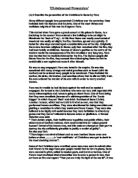He did not halt in his good works however as verse 30 shows. Later on he performs a miracle on the Sabbath day a day that the Jews regarded as holy and would endeavour not to work. When he cured the man with the withered hand they weren’t happy. In Luke 6:11{(11) But they became filled with madness, and they began to talk over with one another what they might do to Jesus.}
Jesus did not allow the powerful men’s obvious disdain stop the progress of his ministry. Though they frequently made it clear how contemptuously they regarded him he did not allow this to deaden his spirit.
These same religious leaders handed him over to the Roman authorities for being a revolutionary and he was condemned for so-called heresy and executed by crucifixion. The events leading up to his iniquitous death are found in Chapter 23 of Luke. They did not let him die peacefully rather they taunted and ridiculed him until he finally died. It was down to the Pharisees and Sadducees that he was subjected to a criminal’s death and instead of feeling remorse they were proud of themselves.
Persecution in the Modern day
Despite the large numbers of Christians today, some 1.6 billion, a lot of this number are just the kind of hang-on Christian. This is the sort of person who takes their families to church on Sunday’s and at Christmas and possesses a vague sense of conscience. In the west choosing ones religion is as easy as choosing an outfit of a morning. Being in the west we are not subject to a lot of the things that goes on today against Christians.
In several countries where human rights are practically non-existent, Christians have been tortured and persecuted up until this day. In an article posted on the Internet (), barely more than a year ago, heinous images of the pain of innocents are painted. The article refers to the bombings in the Philippines that occurred in late 2003and says “little has been made of the fact that these attacks were aimed specifically at Christians.” Art Moore, the author calls it “one of the most neglected stories” and it is true that not many people are aware of the true cause of the bombings. An estimated .2 billion, over 10%, of Christians worldwide suffer from malicious treatments from various governments.
For example in China several hundreds of Chinese Christians are being forced through “re-education through labour” camps. In Iran the Christians suffer arrest, imprisonment and torture on account of their faith and leaving Islam is considered a criminal offence. Nigerian Christians routinely have their churches burnt down, Saudi governments put a ban on practicing Christianity and for someone to convert to Christianity from Islam is punishable by death penalty. Crucifixion and slavery are still practiced in Sudan and the violations repeatedly conducted against Christians are endless and horrendous.
So how does persecution affect Christians today? The schism between hemispheres is great. Most Christians today have no idea of what is happening in places like Pakistan where mobs and fundamentalist Muslim’s brazenly target Christians.
The sort of persecution western Christian’s face today is mainly from revolutionary scientists and atheists who seek to discredit the bible by making it outdated. Christian’s are often subject to ridicule in today’s “modern-thinking” generation. Scientist’s who claim “God is dead” however do nothing more than mock. Nevertheless some people find themselves giving thought to the anti-Christianity remarks made by these scientists and these people may lose their faith.
To Christians living in different parts of the world persecution will mean different things. A Christian living in England would never expect to be raped maimed and killed to be made an example of. Christian’s living in the upper Nile region of Sudan could plausibly expect this as it would not be the first time it had happened. Conversely the words of a self-important scientist would hardly likely test the faith of Christians who barely escaped alive from mass murder of friends in the faith. A quote from the Christians of Turkmenistan expresses this difference well. They claim that although their persecution is physical the lure of materialism could be just as devastating for the western Christians.
Materialism is basically the striving after material things. Without noticing a Christian could find him or herself putting money and prestige before their faith and becoming increasingly unscrupulous. The same Christians of central Asia also requested this of their fellow Christians. “Please pray not that our persecution will go away, but that there will be enough persecution to keep us focussed on our Lord, but not too much to break us.”
Jesus warned his disciples many times that following him would be a struggle.
Back in his day one had to carry the cross you were going to be crucified on and labour up the countryside. Jesus told his followers that they would have to take up their cross to follow him.
Wherever it is, persecution is always designed to disillusion people of whatever faith. This is the one thing all persecutions have in common, from the crucifixion of Jesus, to the inquisition to the modern day; however the important thing is to withstand it and that is the one thing all religions have in common.
“Christians should expect persecution”
For a long time Christians were persecuted for their beliefs. In the first century, early Christians were victimized endlessly. Because the Christian church was so small and new, the leaders did not like it. For much of the late first century in the Roman Empire being a Christian was illegal and punishable by incarceration. During these times, many Christians became Martyrs for their faith.
Some People may say that because of this Christians should recognize their duty to give up their life for the cause, as did the early Christians. A Christian now should have the same faith as any Christian the first century. Also many of St Paul’s letters to the Galatians, Ephesians, and Colossians etc. were giving them encouragement to withstand persecution and also let them know just how many obstacles he was facing in his own missionary work. Christian’s are expected to believe in the entire bible trusting that the whole book is still as relevant today as it ever was. This means accepting that St Paul’s encouragements should have just as much application to today’s Christian as to a Christian in C1.
But today we live in a society that recognises the faith of every human being to practice whatever religion they choose so in this way no people should expect to be persecuted nevertheless many faiths are. Christians who are lucky enough to live in area’s where there are no difficulties should count themselves blessed.
However remember that Jesus warned his disciples to expect persecution on account of his name. Whether or not Christians are being persecuted or not their faith should remain strong enough to withstand oppression. I think the important thing here is for a Christian to feel in himself that his faith is strong enough to endure. St Paul made mention of the tested quality of faith being a lot more valued by God. Whether or not a Christian expects persecution their quality of faith should not depend on external influences but rather on themselves.
It was Jesus Christ who founded the Christian Church and he was ruthlessly pursued. St Paul too was a central figure and never was he left alone. He was constantly imprisoned due to his missionary work. He never let anything get him down. All Christians should try to follow his example and that of the Christ because keeping the faith is one of the central precepts of Christianity.
In conclusion I think that no one of any faith should anticipate ill-treatment. Christians are supposed to tolerate all faiths and in so doing should expect no less from others, a manifestation of the Golden Rule. Notwithstanding this however no Christian should feel him or herself so far against the wall that they should take the easy way out.







